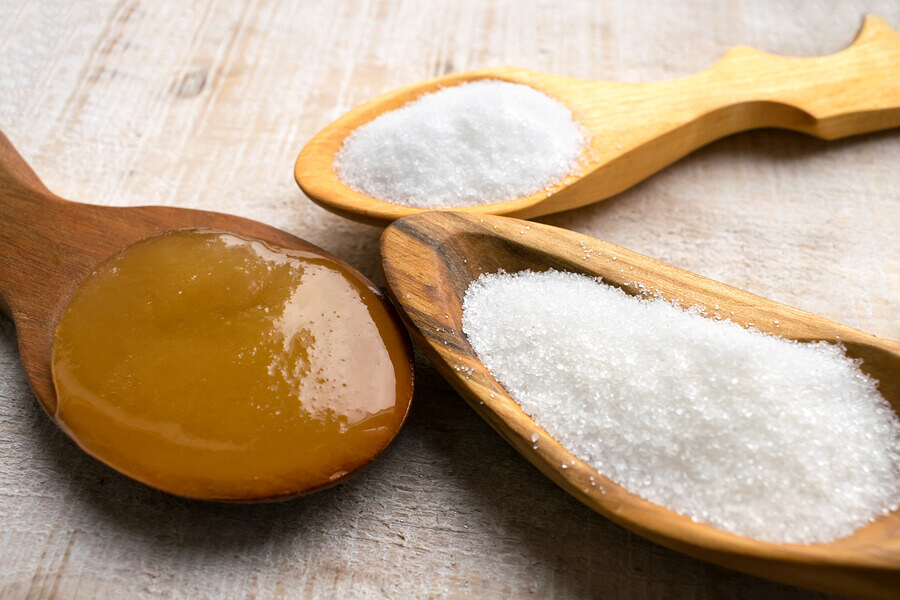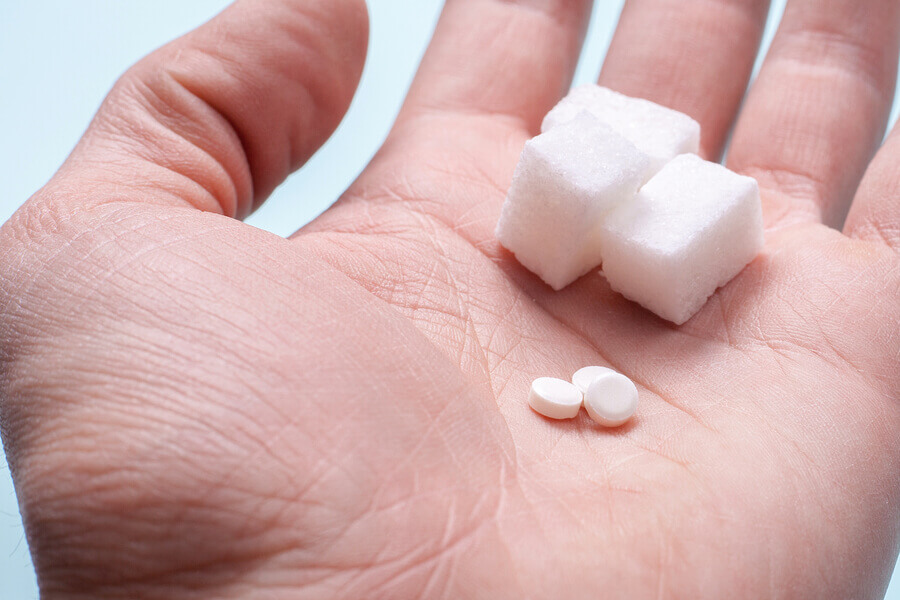Are Artificial Sweeteners Bad for your Health?

Today’s society is all about easy access to food. Consequently, the last decades saw an increase in sugar consumption, setting off levels of obesity and weight problems in the general public. But can artificial sweeteners be a solution?
Cardiovascular diseases are more common today, being one of the main causes of death. These diseases are directly related to obesity. Sugar substitutes, which swap sugar with for a low-calorie option, were introduced as a possible solution.
Artificial sweeteners
Artificial sweeteners are chemical substances that people use to sweeten food or drink. Primarily, they enable consumers to sweeten foods easily by using small amounts of sweetener. In addition, they also flaunt a low-caloric value. Thanks to these benefits, they’re widely used in diet beverages and low-calorie soft drinks.
While artificial sweeteners are great for reducing sugar intake, they’re not entirely free from controversy. Certain studies claim that these substances can have harmful side-effects.
Benefits of artificial sweeteners
The reduced sugar intake that these substances imply is the biggest benefit that they offer. Food and beverages that replace sugar with these sweeteners help us reduce our daily sugar intake.
A low-sugar diet is linked to a lower body fat index as well as triglyceride and cholesterol levels. In addition, it generally promotes better well-being. This all reduces the likelihood of suffering from coronary diseases or type-II diabetes.

The downside of artificial sweeteners
Now, we have to highlight that all of the benefits that these sweeteners have to offer ultimately boil down to reducing sugar intake. Furthermore, they’re only beneficial in moderation.
Backing up the doubts, a recent study investigated the long-term effects of consuming high amounts of artificial sweeteners in mice using popular varieties such as saccharin and aspartame. The results showed a significant amount of alterations in gut flora.
Gut flora
Gut flora is an entire ecosystem of bacteria that live in our bodies. These bacteria live in our large intestine wall and are hardly harmful. In fact, they help us digest many foods.
Day by day, scientists are discovering more benefits that these bacteria offer. In fact, many even believe that they’re just as crucial as our organs.
What happens when gut flora suffers alterations?
But the truth is that scientists aren’t entirely sure of how changes in gut flora exactly affect humans. In addition, they also can’t confirm that such alterations would have as big as an impact as it does in mice.

They can confirm, however, that changes in this micro-organism eco-system lead to a decreased glucose tolerance. Furthermore, lower tolerance is linked to metabolic syndrome and prediabetes.
Metabolic syndrome is a condition in which the body can suffer high blood sugar levels, hypertension, and high triglyceride and LDL cholesterol levels in the bloodstream. On top of these biochemical changes, there’s a low tolerance to exercise and central obesity– fat in the abdominal area and hips– is also common. This syndrome can lead to type-II diabetes and increase the risk of suffering heart disease.
To wrap up, the consequences that we try to avoid by reducing our sugar intake can still be a risk if we consume high amounts of artificial sweeteners. Try to avoid or limit your intake as much as you can until research can make clearer conclusions.
Today’s society is all about easy access to food. Consequently, the last decades saw an increase in sugar consumption, setting off levels of obesity and weight problems in the general public. But can artificial sweeteners be a solution?
Cardiovascular diseases are more common today, being one of the main causes of death. These diseases are directly related to obesity. Sugar substitutes, which swap sugar with for a low-calorie option, were introduced as a possible solution.
Artificial sweeteners
Artificial sweeteners are chemical substances that people use to sweeten food or drink. Primarily, they enable consumers to sweeten foods easily by using small amounts of sweetener. In addition, they also flaunt a low-caloric value. Thanks to these benefits, they’re widely used in diet beverages and low-calorie soft drinks.
While artificial sweeteners are great for reducing sugar intake, they’re not entirely free from controversy. Certain studies claim that these substances can have harmful side-effects.
Benefits of artificial sweeteners
The reduced sugar intake that these substances imply is the biggest benefit that they offer. Food and beverages that replace sugar with these sweeteners help us reduce our daily sugar intake.
A low-sugar diet is linked to a lower body fat index as well as triglyceride and cholesterol levels. In addition, it generally promotes better well-being. This all reduces the likelihood of suffering from coronary diseases or type-II diabetes.

The downside of artificial sweeteners
Now, we have to highlight that all of the benefits that these sweeteners have to offer ultimately boil down to reducing sugar intake. Furthermore, they’re only beneficial in moderation.
Backing up the doubts, a recent study investigated the long-term effects of consuming high amounts of artificial sweeteners in mice using popular varieties such as saccharin and aspartame. The results showed a significant amount of alterations in gut flora.
Gut flora
Gut flora is an entire ecosystem of bacteria that live in our bodies. These bacteria live in our large intestine wall and are hardly harmful. In fact, they help us digest many foods.
Day by day, scientists are discovering more benefits that these bacteria offer. In fact, many even believe that they’re just as crucial as our organs.
What happens when gut flora suffers alterations?
But the truth is that scientists aren’t entirely sure of how changes in gut flora exactly affect humans. In addition, they also can’t confirm that such alterations would have as big as an impact as it does in mice.

They can confirm, however, that changes in this micro-organism eco-system lead to a decreased glucose tolerance. Furthermore, lower tolerance is linked to metabolic syndrome and prediabetes.
Metabolic syndrome is a condition in which the body can suffer high blood sugar levels, hypertension, and high triglyceride and LDL cholesterol levels in the bloodstream. On top of these biochemical changes, there’s a low tolerance to exercise and central obesity– fat in the abdominal area and hips– is also common. This syndrome can lead to type-II diabetes and increase the risk of suffering heart disease.
To wrap up, the consequences that we try to avoid by reducing our sugar intake can still be a risk if we consume high amounts of artificial sweeteners. Try to avoid or limit your intake as much as you can until research can make clearer conclusions.
All cited sources were thoroughly reviewed by our team to ensure their quality, reliability, currency, and validity. The bibliography of this article was considered reliable and of academic or scientific accuracy.
- Wang, Q.-P., Browman, D., Herzog, H., & Neely, G. G. (2018). Non-nutritive sweeteners possess a bacteriostatic effect and alter gut microbiota in mice. PLOS ONE, 13(7), e0199080. https://doi.org/10.1371/journal.pone.0199080
- EDULCORANTES ARTIFICIALES. (n.d.). Retrieved from http://www.endocrino.cat/es/blog-endocrinologia.cfm/ID/7878/ESP/edulcorantes-artificiales.htm
This text is provided for informational purposes only and does not replace consultation with a professional. If in doubt, consult your specialist.








